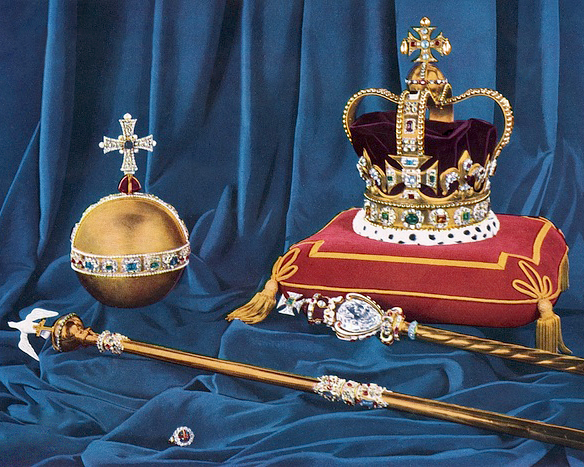The changing Irish state attitudes to British royal coronations
Michael D. Higgins's attendance at this weekend's coronation marks a significant break with tradition in regard to Irish attitudes to the coronation of British monarchs since independence says Professor Marie Coleman.

The announcement that President Michael D. Higgins, the Republic of Ireland’s Head of State, will attend the coronation of King Charles III at Westminster Abbey on Saturday, 6 May 2023, marks a significant break with tradition in regard to Irish attitudes to the coronation of British monarchs since independence. Admittedly there have only been two previous such ceremonies since southern Ireland became independent in 1921. The constitutional relationship of the Irish Free State/Irish Republic to the United Kingdom had changed between these two events in 1937 and 1953 respectively and this was reflected in Irish attitudes to both events.
In 1937 the Irish Free State was still a dominion of the Commonwealth and as such the King was Head of State, although the Fianna Fáil government of Éamon de Valera was in the process of altering this in a new constitution then being drafted, which would introduce the new office of President of Ireland. Bunreacht na hÉireann was the culmination of De Valera’s efforts, since the election of his government in 1932, to expunge as many references as possible to the King from Irish government and constitutional affairs. It was a natural progression from the abolition of the oath of fealty to the monarch and his successors required of members of the Oireachtas (among the most contentious aspects of the 1921 Anglo-Irish Treaty) and the removal of a legal right to appeal judgements of the Irish courts to the British Privy Council.
The British did not look favourably on these moves and the state of Anglo-Irish relations in the mid-1930s was further affected adversely by an ongoing trade war triggered by De Valera’s with-holding of the land annunities (repayments on loans advanced by the British government in the later nineteenth century to facilitate the purchase by Irish tenant farmers of their holdings). In this atmosphere the British could have been expected to respond extremely negatively to the effective demotion of the king from the Irish constitution. The abdication crisis of late 1936 and De Valera’s masterful exploitation of Britain’s constitutional embarrassment effectively precluded any serious objection and eased considerably the introduction of De Valera’s new constitutional arrangements.
When the crisis deepened in December 1936 over whether Edward VIII would defy the establishment and insist on retaining the crown while marrying Wallis Simpson, Irish diplomats recognised the potential benefit to their manoeuvrings, cautioning that the Free State Government ‘should be slow to impede the proposed marriage’ because of its likely (favourable from their perspective) impact on weakening the monarchy and strengthening the hand of the Dominions against the British government.
Within a day of the Westminster Parliament endorsing the abdication of Edward VIII on 11 December 1936, De Valera moved swiftly to enact on the following day two short acts. One deleted all references to the King from the Irish Free State Constitution (which would be replaced within a year). The second, known as the External Relations Act, recognised the abdication and relegated the King (now recognised merely as the head of the Commonwealth) to a minimal role in recognising diplomatic appointments on the advice of the Irish government. The British government was in no position to argue and diplomatic correspondence suggests their relief at the Free State’s recognition of the abdication and succession, in line with the agreement of the other Dominions.
Attention then turned to Irish attendance at the coronation. The Irish failed to have the reference to ‘Ireland’ removed from the new monarch’s declaration ‘to govern the peoples of Great Britain, Ireland, Canada, Australia, New Zealand and South Africa’. The Free State was at odds with the other Dominions which insisted on being named individually but in the end ‘Ireland’ was deemed preferable to ‘Irish Free State’. The separation of this civil authority section of the coronation service from the promise to ‘maintain in the United Kingdom the Protestant Reformed Religion’ and the addition of the qualification ‘as by Law established in England’ were also more amenable to Irish Free State sensitivities.
The Irish government’s attitude towards the coronation was ‘one of detachment and protest’. It turned down invitations to attend and the date of the coronation (12 May 1937) was not recognised as either a bank or public holiday. Yet, there was no objection to the attendance of the Church of Ireland Archbishop of Dublin or the holders of ceremonial offices such as the High Constable and High Steward of Ireland, the Ulster King of Arms, the Dublin Herald and the Standard Bearer of Ireland, at a ceremony which De Valera dismissed as ‘being in no sense legal but simply traditional’.
By the time of the coronation of Elizabeth II in June 1953, De Valera’s External Relations Act had been repealed and a republic had been declared eliminating even the vestigial link to the monarch retained in 1936. Having also withdrawn from the Commonwealth, the Republic of Ireland could have attended the coronation as an independent entity having no formal association whatsoever with the Crown. The refusal to attend was based on the continuance of partition and the royal style and title of the new Queen which included the phrase ‘United Kingdom of Great Britain and Northern Ireland’.
Much has changed in relations between the United Kingdom and the Republic of Ireland in intervening seventy years as characterised by the very different approach to attendance at this coronation.
The featured image has been used courtesy of picryl.com and a Creative Commons license.




